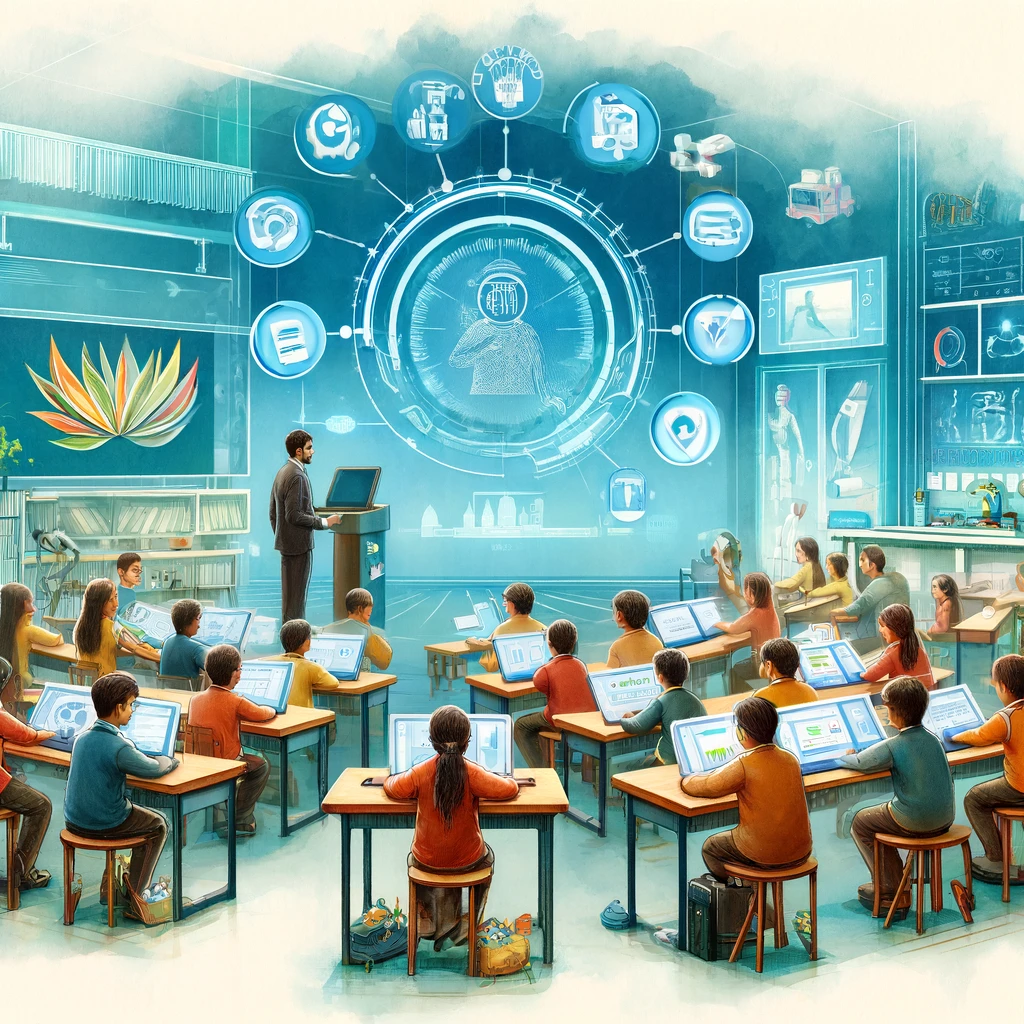NEP 2020 is another milestone in the modern development of the education system of India. After 34 years, a new policy has been brought in to meet the changing dynamics at both the global and national levels. All these issues like a rigid curriculum, lack of emphasis on skills and vocational training, and inequity in access to education for the framing of a new education policy. National Education Policy 2020 aims to ensure an education system that is holistic, flexible, and multidisciplinary inclusive in tune with the requirements of the 21st century.
- The policy plans to bring back 2 crore children who are currently not in school.
- The policy promotes the idea of learning many languages. Also, institutes will be set up to help learn languages like Pali, Persian, and Prakrit.
Key Features of NEP 2020
The following points reflect the main ideas and goals of the National Education Policy 2020.
School Education
- Early Childhood Care and Education (ECCE): Universal provisioning of quality ECCE is a fundamental step in policy. It emphasizes the importance of foundational learning and proposes the integration of pre-primary schools within the primary school framework.
- Curricular and Pedagogical Structure: The policy introduces a new structure of 5+3+3+4, corresponding to the ages of 3–8 years (Foundational Stage), 8–11 years (Preparatory Stage), 11-14 years (Middle Stage), and 14–18 years (Secondary Stage). This replaces the previous 10+2 structure and is designed to enhance cognitive development and critical thinking.
- Holistic and Multidisciplinary Education: A shift towards a more holistic education that includes critical thinking, creativity, communication, and collaboration. The curriculum will integrate subjects such as arts, sports, and vocational skills alongside academics.
- Assessment Reforms: Moving away from rote learning, NEP 2020 introduces a more formative assessment system that evaluates higher-order skills, critical thinking, and conceptual clarity.

Higher Education
- Multidisciplinary Institutions: The policy aims to transform higher education institutions into large multidisciplinary universities and colleges, with at least one in every district by 2030.
- Flexibility in Courses: NEP 2020 introduces a flexible curriculum, allowing students to choose their subjects across disciplines. It also incorporates multiple entry and exit points.
- National Research Foundation (NRF): Establishment of the NRF to promote a strong research culture, funding, and capacity building across higher education institutions.
- Regulatory Framework: A single, overarching umbrella body for the entire higher education sector, excluding medical and legal education, is proposed. This includes the Higher Education Commission of India (HECI), with four verticals for regulation, accreditation, funding, and standards setting.

Vocational Training
- Integration of Vocational Education: The policy emphasizes the integration of vocational education programs into mainstream education at all levels. It aims to ensure that at least 50% of learners receive exposure to vocational education by 2025.
- Skill Development: Introduction of skill-based learning, internships, and practical training from the school level to align with industry requirements and enhance employability.
Implementation Strategy
The implementation of NEP 2020 requires a phased approach involving multiple stakeholders:
- Central Government: The central government will provide overall policy direction, funding, and support for research and innovation. It will also oversee the establishment of regulatory bodies and the implementation of curriculum changes.
- State Governments: State governments will adapt the national framework to local contexts, manage public education institutions, and ensure the implementation of policies at the grassroots level.
- Educational Institutions: Schools and higher education institutions will be responsible for curriculum delivery, integrating vocational training, and adopting new assessment methods.
- Teachers and Educators: Training and capacity building for teachers will be crucial. Professional development programs and continuous learning opportunities will be provided to help educators adapt to the new pedagogical methods.
- Private Sector and NGOs: Collaboration with the private sector and non-governmental organizations will help in mobilizing resources, expertise, and technology to support educational initiatives.
Impact on Education System
Equity: NEP 2020 aims to bridge the gap between different socio-economic groups by ensuring universal access to quality education, especially for marginalized communities. Initiatives like scholarships, digital education, and inclusive practices are designed to enhance educational equity.
Quality: The policy emphasizes improving the quality of education through curriculum reforms, teacher training, and better infrastructure. The focus on holistic education and critical thinking skills will produce well-rounded individuals.
Employability: By integrating vocational training and skill development from an early age. NEP 2020 aims to enhance employability and prepare students for the job market. The flexibility in higher education will allow students to pursue careers aligned with their interests and skills.

Challenges in Implementation of NEP 2020?
- Resource Allocation: Adequate funding and resources are critical for the successful implementation of NEP 2020. Ensuring that all educational institutions, especially in rural areas, receive sufficient support will be challenging.
- Teacher Training: Transforming the teaching methodology requires extensive training and professional development programs. Ensuring that teachers are well-equipped to handle the new curriculum and pedagogical techniques is essential.
- Digital Divide: The reliance on digital education and online resources may exacerbate the digital divide. Ensuring that all students have access to technology and the internet is crucial.
- Monitoring and Evaluation: Effective monitoring and evaluation mechanisms need to be established to track progress and address implementation gaps.
Recommendations
- Increase Public Investment: Enhance public spending on education to meet the targets set by NEP 2020. This includes improving infrastructure, providing digital tools, and funding research initiatives.
- Strengthen Teacher Training Programs: Develop comprehensive teacher training programs that focus on new pedagogical methods, digital literacy, and continuous professional development.
- Promote Public-Private Partnerships: Encourage collaborations between the government, private sector, and NGOs to mobilize resources, expertise, and technology for educational initiatives.
- Focus on Inclusivity: Implement targeted measures to ensure that marginalized and disadvantaged groups have equal access to quality education. This includes providing scholarships, establishing inclusive policies, and addressing the digital divide.
- Robust Monitoring Mechanisms: Establish strong monitoring and evaluation systems to assess the implementation of NEP 2020. Regular feedback loops and data-driven decision-making will help in addressing challenges and making necessary adjustments.

Conclusion
The National Education Policy 2020, is the leap toward the creation of an equitable, quality, and flexible education system in India. Though it has a lot of challenges in its successful implementation, with active and concerted efforts on the part of every stakeholder, the NEP 2020 may bring about a revolution in the Indian education scenario. Thus, it prepares students for the demands of the 21st century and fosters a more inclusive and skilled society.
| National Education Policy UPSC Notes |
| 1. NEP 2020 proposes an education system that is more holistic, flexible, and multidisciplinary to raise the attainment levels of cognitive development and critical thinking. 2. It promotes the learning of various languages, which include Pali, Persian, and Prakrit, ensuring that the cultural heritage and diversity of a nation are preserved. 3. NEP 2020 replaces the age-old system of 10+2 schooling to one that presents itself with more dynamism: 5+3+3+4, corresponding to different phases of child development. 4. Multidisciplinary Higher Education institutions will become multidisciplinary; therefore, adopt flexible curricula, multiple entry-exit, for students. 5. Exposure to at least 50% of learners in the vocational stream, integrating skill development right from school levels by 2025. 6. Formative Assessments: Securing shifts toward formative assessments, valuing critical thinking over mere rote memorization for better learning outcomes. 7. Complete training and professional development for educators to put up with new pedagogical methods and technologies. 8. Public-Private Partnerships advocates collaboration by government, private sector, and NGOs to support educational reforms and resource mobilization. |


